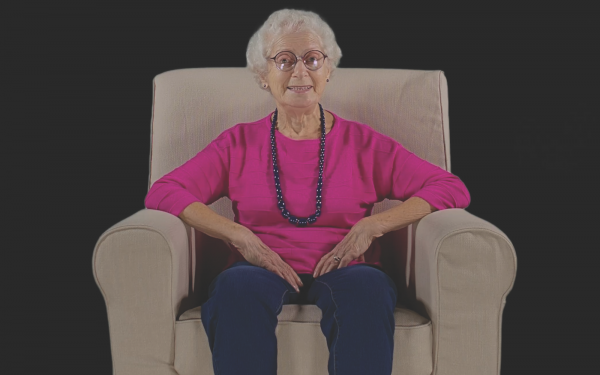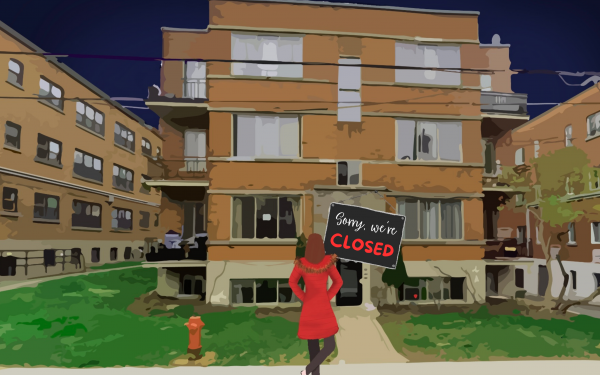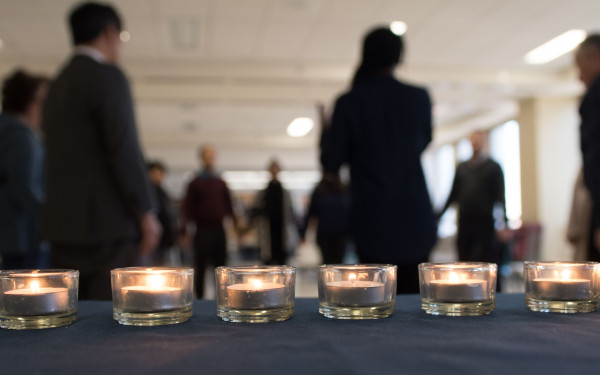Lisa Laflamme interviews Angela Orosz at Montreal Holocaust Museum
Angela Orosz discusses life after the Holocaust and the impact her trauma has had on her children.
Orosz’s life started where many ended, inside the walls of a death camp. She was born Dec 21, 1944 and went completely unnoticed and unnamed by the guards for six weeks until the Soviets liberated the camp.
The Holocaust Museum in Côte-Saint-Luc greeted 78-year-old survivor Angela Orosz on Jan. 26, the eve of the 77th anniversary of the liberation of Auschwitz and National Holocaust Remembrance Day.
Lisa Laflamme, formerly the chief anchor and senior editor of CTV National News, held the public interview for nearly 350 attendees. These included Holocaust survivors, their descendants, allies to the cause as well as numerous news outlets. She discussed how the holocaust as well as the trauma that followed affected Orosz throughout her life and impacted the way she raised her children.
Much of the discussion was centred around Orosz narrating her life story and the impact her trauma has had on her children as second generation survivors.
“Nobody knew my mother had given birth. Three hours later, she had to go to roll call. She had a fire burning in her belly. She wasn’t scared. She knew she had to save the baby,” said Orosz.
Weighing only 2.2 pounds and unable to cry due to malnutrition, Orosz is one of the two youngest Holocaust survivors.
“Considering the meals that were served during their time at the camp, it was a shock my mother even had milk to give me,” said Orosz. The meals consisted of black coffee in the morning, cold soup made of rotten vegetables and a slice of bread at night. This equated to a mere 300 to 400 calories per day.
“They thought I was going to die. That’s why they called me Angela. They said that any minute I would be an angel so let’s give her the name Angela,” said Orosz.
Malnutrition was not the only thing that Orosz’s mother was fearful of. The bunks, where Angela was born and hidden during her six-week life at the camp, were infested with rats much bigger than the baby itself.
“The rats were very hungry. That was her biggest fear. That the rats would eat me while she was gone,” she said.
Orosz’s mother strived to form a new life from scratch after being freed from their worst nightmare. Still, she would not allow their story to be forgotten as Angela grew up.
“It was difficult and the first difficulty I had was when I was in grade one,” said Orosz. "They wanted you to explain where you were born. I didn’t know how to spell Auschwitz. So, I was begging my mother to change it. My mother told me that we weren’t going to change it. I was going to learn where I came from."
Orosz’s mother continues to cry every Jan. 27 of every year, remembering everything about her time at the camp. Being subject to her mother’s trauma all throughout her life, Angela feared the possibility of another holocaust.
After decades of avoiding the camp where she was born, Angela’s step-brother finally convinced her to return to Auschwitz in 2015.
“I cannot tell you how petrified I was. I was too scared to take a step in case I saw somebody’s blood or if I heard crying. I didn’t sleep at all,” she explained.
Orosz returned once again to Auschwitz for the March of the Living in 2020. This time, she was accompanied by a number of Jewish students from Montreal. Although returning to what was once a death camp was harrowing, she kept her composure for the students.
“I had to be strong. They were crying so I had to be the strong one. I had to hold them up and I had to wipe away the tears,” she said.
The March of the Living in 2020 was the debut of Laflamme’s and Orosz’s friendship since Laflamme was covering the event for CTV news.
Despite the gravity of the subject matter and the emotional significance of the day itself, the bond between Orosz and Laflamme was undeniable through a display of witty jokes and an evident fondness of one another.
“I don’t normally become pen pals with the people that I’ve interviewed but those of you who know Angela, and certainly you will know her after this evening is done, you’re an impossible person to forget. I love you; I’ve learned so much from you and you inspire me,” said Laflamme.
“There is such a huge number of Holocaust survivors who came to live in Montreal. Around nine to ten thousand survivors plus their younger generations. This is a survivor community,” said Rachelle Alkallay, an attendee.
Sarah Fogg, the head of communications and marketing at the Montreal Holocaust Museum said she had not expected such a large number of attendees for the event and was thrilled by the ongoing interest in the Holocaust.
“This is such an amazing number of people who represent the amazing interest in the history of the Holocaust and this is such a wonderful thing for us at the Holocaust Museum because we depend on these visitors. We depend on the on-going interest,” said Fogg.
Montreal has one of the largest Jewish communities in Canada. The Montreal Holocaust Museum and survivors like Angela Orosz are working endlessly to ensure that the history of the Jewish community and the stories of the survivors are never forgotten.
“This is the new generation, please prove me wrong by ensuring Holocaust won’t happen again. It is your duty to learn to fight against it, speak up and not to judge people,” said Orosz.







